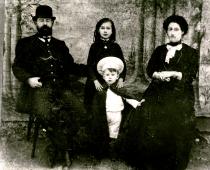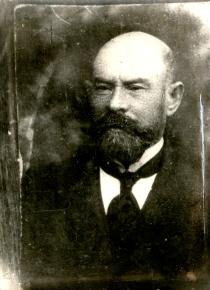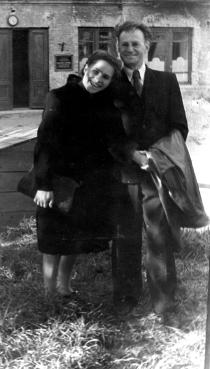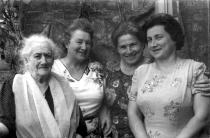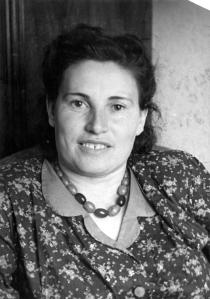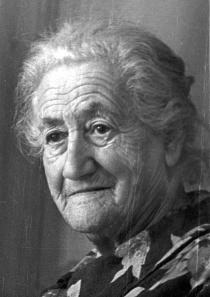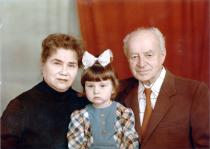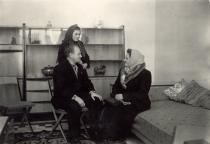
Samuel Sukhenko
Kiev
Ukraine
Interviewer: Ella Orlikova
I was born in a very small town called Grigoriopol. The town got this name
in the middle of the 18th century from the Armenians, in honor of Grigory
Potyomkin. Grigoriopol was on the Dnester River in Moldova. The nearest
town on one side was Dubossary; on the other, Tiraspol.
Four nationalities lived in the town - Armenians, Russians, Jews and
Moldavians. The population was about 1,000. However, there was a town
council, one gymnasium and a technical college. The Jews lived in several
small curving streets, in little houses with earth floors. They had an
ancient synagogue there. The Jewish population - about 100 families -
worked in commerce and crafts. Except for domestic crafts, there was no
industry there. There was one steam mill that belonged to a rich Jew named
Borshir. In our small town I never felt any anti-Semitism - we all were one
family.
The Sukhenko family differed from the rest of the Jews in the town because
our family toiled the land and did not live among the Jews. There were four
brothers. My father was the youngest. He was born in 1870; his name was
Kopel-Duvid. We lived among the Armenians. The oldest brother, Joseph, who
was 20 years older, lived among the Moldavians. He had a large garden and
raised bees. The third brother, Shloime, lived among the Russians, while
the fourth, Yankel, lived between the Jews and the Armenians. He died young
from the Spanish flu.
Who are my forefathers? I became interested in this question when I was 16.
Uncle Joseph, who at the time was older than 90, would tell me: "Your
grandfather was Pushkin's contemporary, he was born in the 18th century; he
was arrested and had to serve 25 years in the army under Alexander I. He
took part in three wars and returned home when he was 37. We don't know
whether he converted to Christianity, but he came back with the name of
Sukhenko. For his service he received a big land plot forever and 100
silver rubles." So, my father and his three brothers possessed this land
until collectivization. When my grandfather returned from the army, his
relatives found him a poor girl to marry, and she gave birth to a lot of
children, who were all Jewish.
My father was a farmer. We grew tobacco. My grandfather was a hatter. My
father's mother, Leah, was able to treat our whole village with herbs. My
father served in the military for four years under Alexander III in the
town of Bendery. In 1902, he left for Argentina; he was invited to develop
agriculture there. My father spent five years in Argentina and spoke
Spanish fluently. He also knew Russian, Moldavian, and certainly Yiddish.
My mother, Tsivye, was born in Chisinau; her father was a house-painter.
Most probably, they were artists, and my sisters and I inherited their
artistic abilities. My mother was illiterate, but she had talent. In the
kitchen, we had a small ceramic pot filled with glue. She used to shape it
- into a little dog, a kitten, or a piggy. All these figures were very
expressive - the dog would stand on its hind paws, the kitten would be
stretching itself. Of course, in that uneducated environment, nobody
appreciated it properly.
My maternal grandfather had several sons. The family was very poor, and,
when my mother was 3, she went to live with her aunt in Kamenka. My
mother's mother, also named Leah, lived with us until the end of her life.
She was a very strong woman. Grandmother told us that she married when she
was 14. Her husband kept horses for the post office, and she worked in the
bakery. Grandmother Leah had a big trunk filled with clothes. From time to
time, she used to air them in the yard. Among her things, there was a
shroud that had been prepared for her burial. As soon as she took her
shroud out, I, the wise guy, would wear it and run around the yard. She
would stand in the doorway and laugh - it was a good sign.
My parents had 10 children; four died when they were young. The first boy died when he was 8 days old, from blood poisoning when he was circumcised. Three girls died in the first year. My elder sister Taube (Tanya) was born in 1902. She married when she was very young. Tanya was going to be a painter, but unfortunately, she did not have the opportunity to receive a good education. She began to work as a secretary after the death of her husband. She had no children. At the end of her life, she lived with our
youngest sister, Inna.
I was born in 1908; in 1912, my sister Lena was born. After graduating from the seven-year school, she married. Lena was a housewife and raised two sons. My youngest sister, Inna, was born in 1920. She was single. First, she worked as a theatre designer, then as a book designer in a children's publishing company. My brother, Fima, was born in 1925; he was killed at the front when he was 18.
My parents lived a very good life. We rented a house with five rooms. My two grandmothers lived with us. We had two cows, goats and a large yard. Every Saturday we had a wonderful dinner at home. We always had some poor guest at the Shabbat table. When he left, my mother would give him a chicken and a loaf of bread that my grandmother had baked. Every morning my father would put on a tallit, white clothes and pray. He regularly went to a synagogue. On the way back, the sons always looked in on their mother, who lived near the synagogue. They would drink a toast, wish their mother a peaceful Shabbat and go home.
I remember well our family seder. We arranged some chairs, covered them with pillows so my father could recline on them. There were new plates and glasses on the table; we ate matzah and all sorts of things. Then we opened the doors, Father said a prayer and offered a glass of wine. Children always wondered: Would they see the wine receding in the glass? We believed that somebody really would come to drink it. My parents were fond of singing: both of them had a good ear for music. Every Saturday they used to sing Jewish songs together, and Tanya danced with a walking-stick. I still remember those melodies, although then I was only 9 or 10 years old. This continued until 1920.
Soviet rule began in 1917; first, the Germans came, then Denikin's soldiers. In January 1920, the latter were thrown out, and the Soviet rule began. There were no pogroms. But when 90,000 of Denikin's soldiers passed through our village, they would rob Jewish houses and rape girls. This went on for three days, and I remember every detail of it, even now. All day and all night, by horses and in cars, Denikin's army passed through our village. We lived in a very beautiful house, so my parents, my youngest sister and me moved to our neighbors. It was a small house with an earth floor. A poor Jewish family lived there. Once, five Cossacks burst into the house. They were looking for gold, but those poor people had never seen any gold themselves. Then Cossacks began to threaten to kill them. They told us to stand on the trestle-bed near the stove and said, "Now we'll kill you." My father, who was a military man, whispered to us, "Be quiet, they just want to intimidate us." They heard and began to shout: "Who here speaks, Zhid?" Then they took the neighbor's daughter, stripped her naked, straddled her and prodded her with whips. All the same, where could her parents find gold? Then they took her by force to another room. After some time they went away; the girl was left there. We run away from their house as quickly as possible. I was 11. Denikin's soldiers left, and for a whole week, nobody was in control. Then a small detachment of mounted Red Army soldiers appeared. In front of us boys, they shot a soldier of the White Guard, whose body then lay in downtown for a long time, eaten by pigs.
And then everything began: no job, no money. Special food-confiscation units, for Bolshevik powers, took our cow, grain, horses - everything. Then an American aid society appeared and fed the Jewish children. They gave us rice and cocoa. My aunt had five children. Her husband died from the Spanish flu. What could that poor woman do? My father supported her. We lived in miserable conditions. There were two reasons. First, the food-confiscation units ate all our grains. The next year, we had a poor crop, so when spring 1922 came, we had nothing to plant. The authorities gave us some corn seed, and my father took me to plant it. He chopped a hollow in the ground, and I dropped the seeds. That autumn we had a fantastic harvest, but life still was very hard. Everything was incredibly expensive. For instance, a kilo of corn was 3 millions rubles, while a box of matches was 1 million. However, the same year, 1922, Lenin introduced the New Economic Politics. The next month the market was filled with various goods.
I started my education at the age of 4. My grandmother took me to cheder, which was a 15-meter-long room with a wooden floor and two benches. The rabbi was an old man. I studied there until I was 8. We read stories about the Jewish people. The instruction was in Yiddish. At home, we spoke only Yiddish.
I began to speak Russian at the age of 6, because my sister Tanya went to gymnasium and brought home her alphabet book, which I learned very quickly. When I was 8, my father decided that I needed to know Russian, and he sent me to the parish school. I was the only Jew in that school. I was placed in the second grade because I could read. I had a very clear articulation, and I read from the Gospel. And it was the Gospel that led me to atheism. When I was 10, I began to write poems and short stories. I tried to imitate Yesenin, Bagritsky, and others. My teacher, Nastasia Nikolayevna, insisted that I continue with a literary education, but I realized it was only imitation, which nobody needed.
I was a Pioneer, but before that, I was a Boy Scout. After 1917, our villages were occupied by the Austrians for about a year. The boys were organized, given sticks about 1.5 meters long, and we had to listen to lectures. At our school, we had the portrait of the first British Boy Scout. I was a Pioneer for a very short time. I remember than once we spent some time in the woods while at a summer camp. In 1924, I joined Komsomol, when every young man or woman joined, in connection with Lenin's death.
At 15, I graduated from the seven-year school and went to Tiraspol. I worked as a carpenter in a factory. There were a lot of Jews in Tiraspol. Mainly they worked at the big fruit-processing factory, but also in various crafts. Almost all the shoemakers, bakers and shopkeepers in Tiraspol were Jews, and we didn't feel any anti-Semitism there. In 1926-1927, I lived with a Jewish family. I worked with the husband, and his wife, as was the custom, brought our lunch to the factory.
I realized that I needed to study. In 1929, I left Tiraspol for Leningrad, and began to work at the furniture factory and study at the workers' faculty by correspondence at the same time. In two years, I graduated from the faculty. I entered the Architecture Institute when Komsomol members were invited to enter.
At home I was called Shmilik. My friends called me Milia. In 1936, everybody had to obtain a passport. Passports were written by the students themselves. My colleagues asked, "What name do you want in passport?" I said, "Samuel" - it was the first name that came to mind.
I graduated from the institute in Leningrad with honors in 1936, and immediately began the post-graduate course, studying in the evenings. At the same time, I was sent to a prestigious institution as an architect.
In 1936, something terrible was going on in Leningrad - the destruction of people. When Kirov was killed in 1934, all Leningrad knew that Stalin had killed him. You can't imagine what was going there. All the students came out to see how Kirov's body was carried to Moscow on a carriage, and Stalin himself was standing behind it. Then the Stalinist terror started. Today you could meet your friend, but tomorrow he could be arrested and executed. I wanted to get as far away from that place as possible. My manager at work was a Swedish man named Vigman. He understood what was going on. He sent me on a business trip to the Far East for one year. I had planned to join the Communist Party, but on his advice, I cancelled my registration with the Party in Leningrad. I did not register in the Far East either. I spent one year there, in Khabarovsk, designing one of the districts of that city. I was afraid to go back to Leningrad, so I found some connections in Kiev in the post-graduate course I was taking. I came to Kiev in 1938.
Very quickly I found a job in the Military Designs Institute. We designed the defense line that was built in 1940; we designed military aerodromes, as well. We built dozens of them. Our business trips were carried out in the following way: you were sent there for a month, did a certain portion of the work, returned, and another person was sent. Everything was encoded. I also saw many Jews at the sites building aerodromes, and my heart cried out for them. They wore black plush caps, beards. I thought a lot about them - they most likely all perished there.
I designed two aerodromes on our western border. On the eve of World War II, I was at an aerodrome in Peremyshl. On June 21, 1941, a small plane landed there; I was standing with General Ivanov. The plane brought a commander who said, "War broke out with Germany." I was sent to Lvov on June 22. In the afternoon, German planes began to bomb the city. As soon as they finished bombing, our planes appeared, but the bird had flown. Our planes flew away, while those appeared again - it was the same for some days. At our headquarters, nobody paid attention at me. "You are free," they said. "You can go anywhere you like." All railways were already cut off, so I had to make 30-kilometer rush to the East.
On June 27, I left Lvov and with great difficulties arrived in Kiev a few days later. When we were moving eastward from Lvov, there was a unit that picked up only those it wanted. I saw a lot of Jews who were sent back with the words, "Go back to defend Lvov." At the river crossing - you can't imagine what was going on that bridge! People tried to cross it by car, with cows, while planes flew above their heads.
In Kiev I lived in Proreznyaya Street with my two sisters. While I was away, my sister Lena Nagornaya, who had lived in Trans-Carpathians with two children - 1 and 5 five years old - raced to Kiev. A few days later, Tanya sent her, her children and our younger sister deeper into the country. On July 8, Tanya and I gathered our belongings and went to our offices. On July 9, we were put on a train for the East. We came to the city of Ulyanovsk, and our Military Designs Institute became part of the Volga military command. Three Kiev residents - three Jews - were put in charge of three groups. I was sent to Buzluk to continue to build an aerodrome there; then I was transferred to Chkalov. I did not wear any uniform, I was considered a civilian, but I could not leave that place because of the war-time laws. I designed many aerodromes and roads near the front line.
On November 6, 1943, Kiev was liberated. On November 12, 1943, I was sent to Kiev. The city was bombed every day. Kiev was ruined... Once I ran into a pre-war colleague. He was an engineer. He showed me a narrow green paper with the words of the sadly known instruction: "For all kikes of the city of Kiev..." He was a Ukrainian, and his wife was a Jew. Not far from the street leading directly to Babi Yar, he sensed something, and they turned to the nearest lane. The same day they left Kiev for a village; after some time, they came back. He had a two-room flat, so he hid his wife in the second room, bricked up a door, leaving a narrow hole near the floor. The hole was covered with a carpet. When his neighbors asked, he said his wife had been at Babi Yar. For almost two years, she lived this way, and lost her mind. Moreover, her sister came. She was in the military and escaped. He hid her in the same place. My colleague fed them both, cooking in small portions, for neighbors could suspect nothing. The most dangerous time was when Germans turned out people from Kiev and burned houses. But he decided, "Come what may" - and didn't go anywhere. All of them survived, and later, his wife recovered. That was the first time I heard the words "Babi Yar."
During the war, I was awarded with many medals. The Special Military Command was set up in Kiev, and I worked there until the year 1949.
My house was taken for an official use. I was given another flat, in Vorovsky Street. Tanya, Lena and her children, and Inna moved there, as well. In 1946 I invited my parents to live with us. So, we had eight people living in that one flat; it was a room in a communal flat, and we were cramped.
In 1944, the Military Liaison School moved to Kiev. Its deputy chief, a military man, had a daughter, Nina, who later became my wife. I fell in love with her. The city was empty, and we met one another. She was 15 years younger than me. She was a Russian girl. She had graduated from nine grades of school. Fifty to sixty percent of her friends from school were Jews. My dear Nina taught organization of industry at the Polytechnic Institute in Kiev. Every year, she was supposed to name two young people for the post- graduate course, and she always named Jews. Later she was summoned to the director, who told her, "Listen, we need to raise our national comrades," to which she said: "Right, but they need to have heads on their shoulders, too." They could do nothing with her.
When I got married, my mother said a wise thing: "God has created all people alike." And in her family I was considered a son. My Nina was a better Jew than I was, and she worried a lot. The worst thing in our country was official anti-Semitism. Let me give you an example. I often visited Leningrad. Especially I liked to go to Kazansky Cathedral, which was turned into the Museum of Atheism. First, as a professional, I was interested in its interiors. And second, the exhibition was very interesting. Once I noticed the bust of Spinoza, which had a sign saying: "a famous Dutch scholar." I asked the museum specialists: "Excuse me, I have looked at your exhibition on Spinoza attentively, but still have no idea about his nationality. Who was he? A Dutchman? Or maybe...a Turk?" They were very confused and mumbled, "Don't you see? It is written here - 'a famous Dutch scholar.'" That was the time when a Jew couldn't be called a Jew. One more example: I organized exhibitions for our government. The system was that, first, the exhibition was visited by the government, led by the first or second secretary of the Communist Party of Ukraine, then members of the Council of Ministers came, and so on, and only after that a small group of professionals was allowed to come. Once, an official came for a preliminary inspection. He was delighted with everything, but suddenly he stopped dead. "Comrade Sukhenko, what is this?" "A pedestal for a sculpture," I answered. "But look at its form! It is a hexahedron!" When I asked what was wrong, he said, "This is a Jewish sign." "What Jewish sign? Sorry, but it is a pedestal for a sculpture." "No, it is a Jewish sign," he began to shout. "You are either a cretin or idiot," I said. But he continued to yell, "You are a Jew, aren't you?!" "YES," I said. You won't believe me, but I got away with it, although consequences could be rather serious.
We felt cramped in our flat. I was offered another job, with higher salary and promises of a new flat. I rented a flat at the writers' house, 48 Lenin Street. Famous writers lived there. I rented a room from the widow of a Jewish poet, who had moved from Poland and was killed at the front. Every night, a car would come and take away this or that writer. Once I heard a knock on the door at 2:00 a.m.; somebody came in and said they needed a witness for the arrest of writer Itzik Fefer. I refused, claiming I had a terrible stomach ache. The next day Fefer's sister came to me and asked me to take a parcel to him. I took the parcel, spent eight hours in line and passed it to him. My friends scolded me, "What will happen to you?!" Later I learned that Fefer was executed. How can one be a member of the Communist Party after the death of Mikhoels - a great man, a great humanist? I remember the death of Stalin, how people behaved wildly, like idiots. He was a monster; I can't believe he was born of a woman.
In one year I increased the personnel of our design bureau from 10 to 120 people. A year later, I received a flat in Kreschatik, close to the cinema. We worked with interiors of theaters, cinemas and flats. I took part in many exhibitions and was awarded many medals there. I was living a very good life. In 1949, my daughter Olga was born. She studied at the same school her mother had studied at, and she graduated with honors. She was sent to one of the leading institutions, and now this institution is nothing.
When Nixon was about to come to Moscow I decided to show him the interior of the Yalta conference, the Levadia Palace. I examined the building, but there were no pictures, no descriptions - everything was top secret. Then I realized that there must be people who had seen it before. The one who used to be a lieutenant became a colonel. These people were brought to me and they told me everything they remembered about the building. The building was built in the modernist style. So, I ordered, "Find me chairs in the modernist style." And chairs were found, and I had them renovated. Then I found pictures in the modernist style. And then I called Moscow and reported that the task has been completed, for which gratitude was expressed.
In the most difficult times - in the 1960 and 1970s - when Jews could not find jobs, I used to tell my friends that nobody would touch me: such specialists could not be discharged. My family never discussed emigration. I knew too little about Israel. It is only now that I'm learning more and reading about it.
